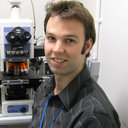Cerebral hypoxia-ischemia and middle cerebral artery occlusion induce expression of the cannabinoid CB2 receptor in the brain.
Atslēgvārdi
Abstrakts
Until recently the cannabinoid CB2 receptor was believed to be absent from the central nervous system. In this study we have identified CB2 expressing cells that appear in the rat brain following stroke and hypoxic-ischemia. At 3 days following surgery CB2-positive macrophages, deriving from resident microglia and/or invading monocytes appear on the lesioned side of the brain. By day 7, a mixed population of CB2-positive cells is present. Microglia-derived macrophages are the key cells in the first stages of brain inflammation, and a pivotal step in the neurodegeneration that follows the acute stage of injury. Thus, CB2 may be important in the brain during injury, and in inflammatory neurodegenerative disorders. The presence of CB2-positive cells in the brain following stroke may provide a novel strategy for cannabinoid-mediated intervention into stroke induced neurodegeneration without the psychoactive effects of CB1 receptor stimulation.


